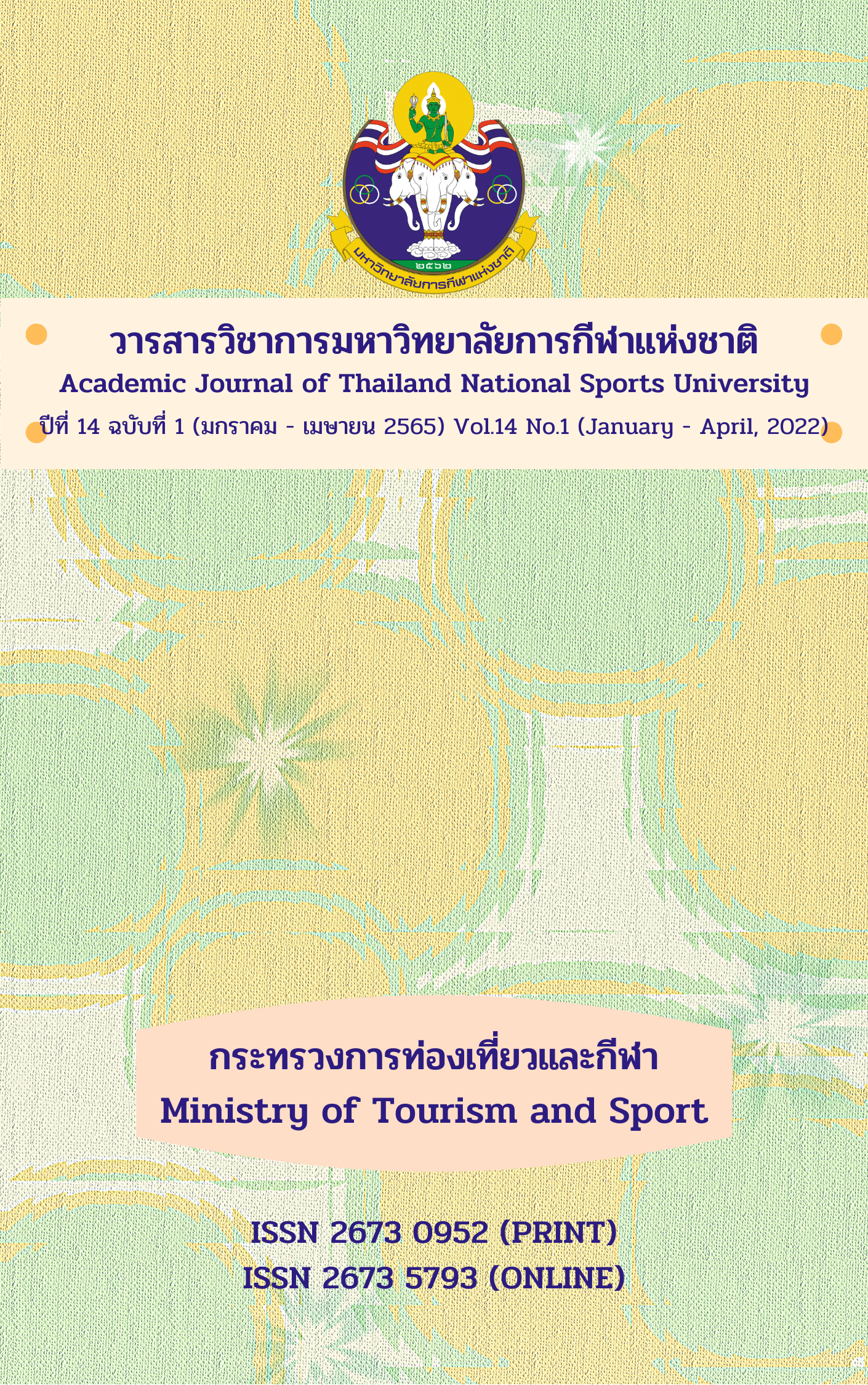MANAGEMENT MODEL OF PROFESSIONAL FOOTBALL CLUBS IN THAILAND TOWARDS CONSTRUCTION OF VALUE ADDED IN SPORTS INDUSTRY
Main Article Content
Abstract
The purposes of this research were to investigate the factors affecting management of professional football clubs in Thailand and construction of value added in sport industry; and propose the management model of professional football clubs in Thailand and construction of value added in sport industry. The data were collected from 300 stakeholders in professional football clubs in Thailand and the in-depth interview with a panel of eight experts by purposive selection. A constructed questionnaire and a semi-structured interview form were used as the tools of this research. The content validity (IOC) reviewed by a panel of five experts was found at 0.89 and the reliability was found at 0.84. The data were then analyzed based on conceptual, theoretical and research frameworks for the management model of professional football clubs in Thailand towards construction of value added in sport industry. The data were also analyzed with the focus group method by a panel of seven experts, specialists from Football Association of Thailand, executives from professional football clubs, marketers, managers and people with sports experience for evaluation of appropriateness, feasibility and benefits of the constructed model. The findings revealed as the following:
Two major factors affecting management of professional football clubs in Thailand and construction of value added in sport industry were found in marketing and management. These can promote the professional football clubs in Thailand to create the strategic plan in order to make income and value added continuously.
The management model of professional football clubs in Thailand towards construction of value added in sport industry consisted of management resource development for maximum effectiveness, process for construction of value added in sport industry, and received benefits.
It was concluded that professional football clubs in Thailand can apply this management model to make more income and value added for the country sustainably.
Article Details

This work is licensed under a Creative Commons Attribution-NonCommercial-NoDerivatives 4.0 International License.
The published article is a copyright of the Academic Journal of Thailand National Sports University. The passage appeared in each article in this academic journal is a perspective of each author which is not related to the journal. Each author is required to be responsible for all components of his/her own article. If there are any mistakes, each author must be responsible for those mistakes on his/her own.
References
Bannawat Duangman. (2013). Marketing promotion of professional football clubs in Thailand. Sports management Association of Thailand Journal, 3(1), 11-24.
Best, J.W. (1981). Research in Education (4th ed.). New Jersey: Prentice-Hall.
Boontham Kitpreedaborisut. (2006). Techniques for Construction of Data Collection Tools for Research. Bangkok: Jamjuree Products.
Somchai Prasertsiripan, Rajanee Quanboonchan, Chalerm Chaiwatcharaporn, & Chutha Tingsapat. (2006). Project of research and manual for establishment of professional football clubs. Sports Science School Chulalongkorn University.
Chutha Tingsapat. (1997). A study on indicators for Thailand’s sports development: Sports development for occupation. Bangkok: Research Division, Sports Authority of Thailand.
Daft, R., & L. Richard. (2006). Management (8th ed.). Thomson Leaning, Inc.
Koontz, H., & H. Weilhrich. (1972). Essentials of Management (5th ed.). New York: McGraw Companies, Inc.
Ministry of Tourism and Sports. (2017). National Sports Development Plan, Volume 6, B.E. 2560 - 2564, The Office of the Permanent Secretary to the Ministry of Tourism and Sports. War Veterans Organization Printing Mill.
Panisa Meechinda, & Siriwan Sereerat. (2011). Strategies on Marketing and Planning. Bangkok: Thammasarn Company.
Patchanee Nonthasak. (2009). Modern Management. Bangkok: Pearson Education Indo - China.
Sakul Changmai. (2003). Data collection, data management, and qualitative data analysis. Christian University Journal, 9(3), 164 - 173.
Sports Authority of Thailand. (2006). Principles and guidelines for professional football development in an undeviating way. Bangkok: Professional Sports Division, Sports Authority of Thailand.
Supitr Samahito. (2013). Summary of seminar on sports industry and construction of value added in Thailand. Office of National Economic and Social Advisory Council, Bangkok.
Supitr Samihito, Chai Nimakorn, & Nonthachai Santibutkul. (2005). Guidelines for professional sports development under the consistent support of private and public sectors: Case study professional tennis and professional football. Bangkok: Information and Research Section, Academic Office, Office of Secretary to the Senate.


